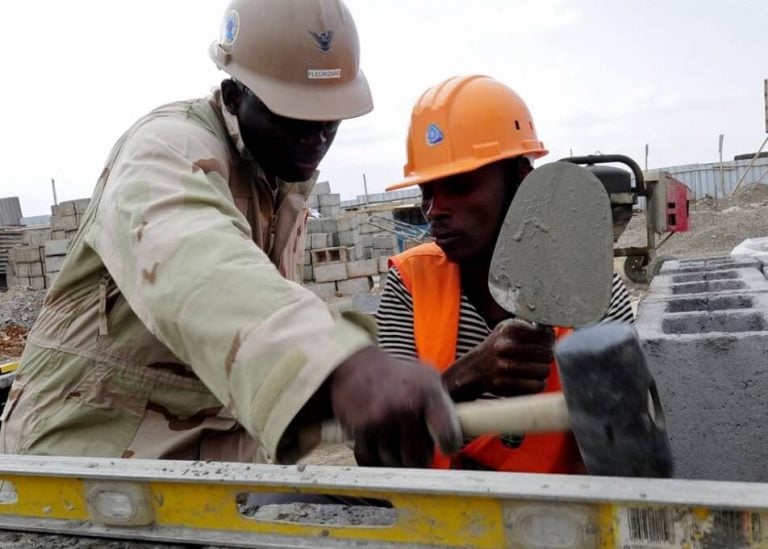How To Start A Successful Real Estate Business in Ghana
In this article, we’ll provide a step-by-step guide on how to start a successful real estate development business in Ghana. From conducting market research to acquiring permits and licenses, we’ll cover everything you need to know to get your business up and running.
With the increasing demand for both residential and commercial properties, you can start a successful real estate in Ghana .This has become an attractive opportunity, as the country’s real estate industry has been experiencing rapid growth in recent years.
As a result, starting a real estate development business in Ghana can be a lucrative opportunity for entrepreneurs looking to tap into this expanding market.
However, like any business venture, starting a real estate development business requires careful planning and execution.
So, if you’re interested in starting a real estate development business in Ghana, keep reading to learn more

II. Conduct Market Research
Before starting a successful real estate development business in Ghana, it’s essential to conduct market research to understand the local real estate industry and identify potential opportunities. Here are some key factors to consider:
- Overview of the real estate industry in Ghana: Begin by researching the current state of the real estate industry in Ghana. Look at factors like market size, growth rate, and key players. This information will help you understand the current demand for real estate properties, as well as the competition in the market.
- Understanding the demand for real estate properties: Identify the types of properties that are in high demand in Ghana. For example, there may be a growing demand for affordable housing or commercial properties in specific regions. Understanding the demand for various types of properties will help you decide what types of real estate projects to pursue.
- Identifying potential locations and target market: Research potential locations for your real estate development projects. Consider factors like population growth, infrastructure, and economic activity. Additionally, identify your target market and their needs. Understanding your target market will help you tailor your projects to meet their specific demands.
By conducting thorough market research, you’ll be able to identify potential opportunities and develop a better understanding of the real estate industry in Ghana. This information will be critical in developing your business plan and determining your real estate development strategy.
III. Develop a Business Plan
Once you’ve conducted thorough market research and identified your target market, the next step is to develop a comprehensive business plan for your real estate development business. A business plan is a written document that outlines your business goals, strategies, and financial projections. It is a critical tool for attracting investors and securing financing for your business. Here are some key elements that should be included in your business plan:
- Executive Summary – A brief summary of your business idea, goals, and strategies.
- Market Analysis – An in-depth analysis of the real estate industry in Ghana, including trends, competition, and potential demand.
- Company Description – A detailed description of your business, including your mission statement, business structure, and management team.
- Products and Services – A description of the types of properties you plan to develop and the services you will offer.
- Marketing and Sales Strategy – An overview of your marketing and sales strategies, including how you plan to attract and retain customers.
- Financial Projections – A detailed analysis of your projected income and expenses, including start-up costs, operating costs, and revenue projections.
- Funding Requirements – An overview of your funding requirements, including how much capital you need and how you plan to use it.
- Exit Strategy – A plan for exiting the business, either through a sale or dissolution.
Remember, your business plan should be well-researched and comprehensive, with a focus on highlighting the unique value proposition of your real estate development business. A well-crafted business plan can help you attract investors, secure financing, and lay the foundation for a successful real estate development business in Ghana
IV. Secure Funding
One of the most critical steps required to start a successful real estate development business in Ghana is securing funding. Real estate development projects can be capital-intensive, and without adequate funding, your project may not get off the ground. Here are some tips on how to secure funding for your real estate development business in Ghana:
- Determine Your Financing Needs: The first step in securing funding is to determine how much capital you need to get started. This will depend on the size and scope of your project. Once you have a clear idea of your financing needs, you can start exploring different financing options.
- Explore Financing Options: There are several financing options available for real estate development projects in Ghana. These include traditional bank loans, private equity, crowdfunding, and government-sponsored financing programs. Each financing option has its advantages and disadvantages, so it’s essential to do your research and explore all your options.
- Build a Strong Business Plan: Having a strong business plan is crucial when it comes to securing funding. Your business plan should outline your project’s goals, market analysis, financial projections, and how you plan to repay the loan. A well-written business plan will help you demonstrate to lenders or investors that your project is viable and has a good chance of success.
- Seek Out Investors: Investors can provide capital for your real estate development project in exchange for an ownership stake or a share of the profits. Finding investors can be challenging, but it’s worth the effort. Consider networking with other real estate professionals or attending industry events to meet potential investors.
- Consider Crowdfunding: Crowdfunding has become an increasingly popular way to finance real estate development projects. With crowdfunding, you can raise capital from a large group of investors, often through online platforms. Crowdfunding can be an excellent option for smaller real estate development projects.
By following these tips, you can secure the funding you need to start your real estate development business in Ghana. Remember to explore all your options and build a strong business plan to increase your chances of success
V. Register Your Business
Once you have developed a business plan and secured funding, it’s time to register your real estate development business in Ghana. This is a crucial step in establishing your business and complying with legal requirements.
The first step in registering your business is to obtain a Tax Identification Number (TIN) from the Ghana Revenue Authority. You will need this number to register your business with the Registrar General’s Department. The registration process involves filling out an application form, paying the required fees, and providing all necessary documents.
When registering your business, you will need to choose a name that is unique and not already in use. You should also decide on a legal structure for your business, such as a sole proprietorship, partnership, or limited liability company (LLC).
It’s important to note that registering your business is not just a legal requirement, but it also provides many benefits. Registered businesses have more credibility and are more attractive to potential investors and customers. Additionally, registering your business protects your personal assets in case of any legal issues.
To ensure that your business is properly registered and in compliance with all legal requirements, it’s recommended that you consult with a lawyer or a business registration consultant.
In the next section, we’ll discuss the importance of hiring a team for your real estate development business in Ghana.
VI. Hire a Team
Real estate development is a team effort that requires collaboration between various professionals. As the owner of a real estate development business, it’s essential to hire the right team members to ensure a successful outcome. Here are some tips for building a winning team:
- Architects: Hire an experienced architect to design your real estate development project. They’ll be responsible for creating the plans and blueprints that contractors will use during the construction phase. Look for architects with a proven track record of designing successful real estate projects in Ghana.
- Contractors: Find reputable contractors who can execute the construction phase of your project. Your contractor should be able to provide you with a detailed estimate of the costs and timeline for your project. It’s essential to hire contractors who have experience working on similar projects in Ghana.
- Lawyers: Real estate development involves navigating complex legal and regulatory requirements. Hire a lawyer who specializes in real estate law to help you navigate these challenges. They’ll be able to provide legal advice and ensure that your project complies with all necessary regulations.
- Accountants: A real estate development project involves significant financial investment. Hire an accountant who specializes in real estate development to help you manage your finances. They’ll be able to help you with budgeting, forecasting, and financial reporting.
- Marketing Professionals: Once your project is complete, you’ll need to market it to potential buyers or renters. Hire marketing professionals to help you create a marketing plan and execute it. They’ll be able to help you with branding, advertising, and public relations.
Remember that teamwork is critical to the success of any real estate development project. Hire professionals who have experience working together and can collaborate effectively to bring your project to life.
By following these tips for building a winning team, you can ensure that your real estate development project in Ghana is a success. With the right team in place, you’ll be one step closer to achieving your goals and building a thriving real estate development business in Ghana.
VII. Acquire Land and Permits
Once you have developed a solid business plan and secured funding, the next step is to acquire land and necessary permits for your real estate development business in Ghana. Here are some tips to help you with this process:
- Research Potential Properties: Conduct a thorough market research to identify potential locations and properties that align with your business plan and target market. Check for the zoning laws, building codes, and other regulations that may affect your development.
- Assess the Property: Before acquiring the land, assess it to ensure it meets your development needs. Check the quality of the soil, the availability of utilities like water and electricity, and other factors that may affect your construction.
- Negotiate the Purchase: Once you’ve identified a suitable property, negotiate the purchase price with the seller. Work with a lawyer to draft a purchase agreement that outlines the terms of the transaction and protects your interests.
- Obtain Permits and Licenses: Real estate development in Ghana requires various permits and licenses from local authorities. Some of the required permits may include building permits, environmental permits, land use permits, and business licenses. Work with a lawyer to ensure you have all the necessary permits and licenses before starting the construction.
Acquiring land and permits is a critical step in starting a successful real estate development business in Ghana. Make sure you do your due diligence in researching potential properties, assessing the land, negotiating the purchase, and obtaining the necessary permits and licenses. This will help you to avoid any legal or financial setbacks down the road and ensure that your development project is a success.
VIII. Start Development
Once you’ve acquired the necessary land and permits, it’s time to begin the development process. This stage typically involves several steps, including design, construction, marketing, and sales. Here are some tips for successfully managing the development process:
- Design: Work with your team to create a design that meets the needs of your target market. Ensure that the design is feasible and aligns with your budget and timeline.
- Construction: Hire a reputable contractor to manage the construction process. Ensure that construction meets quality standards and is completed on time and within budget.
- Marketing: Develop a marketing strategy to promote your real estate development business and attract potential customers. Use a mix of online and offline marketing techniques to reach your target market.
- Sales: Work with your sales team to sell the properties as they become available. Ensure that sales are conducted in a professional and ethical manner.
Remember that customer satisfaction is key to the success of your real estate development business. Ensure that the properties meet the needs of your customers and provide a positive experience throughout the development process.
By following these tips, you can successfully start a real estate development business in Ghana and create a profitable venture.
IX. Conclusion
In conclusion, starting a successful real estate development business in Ghana requires careful planning, research, and execution.
By following the steps outlined in this guide, you’ll be on your way to building a profitable and sustainable business in this growing industry.
Remember to conduct thorough market research, develop a solid business plan, secure funding, hire a skilled team, and acquire the necessary permits and licenses.
Additionally, stay up-to-date with the latest trends and regulations in the real estate industry to remain competitive.
With hard work, dedication, and the right strategy, you can start a successful real estate development business in Ghana and help meet the increasing demand for properties in the country.
So, what are you waiting for? Start building your business today!
Read Also:
Professionals You Need to Build Your House In Ghana
5 Ways to Become a House Owner in Ghana
Building Your House In Ghana-The Quick Easy Guide
How much is a plot of land in Ghana?
FAQ- Guide to Successful Real Estate in Ghana
What are the legal requirements for starting a real estate development business in Ghana?
Answer: To start a real estate development business in Ghana, you need to register your business with the Registrar General’s Department and obtain a business operating permit from the Metropolitan, Municipal or District Assembly (MMDA). You also need to comply with the Ghana Real Estate Developers Association (GREDA) code of ethics and other industry regulations.
What financing options are available for real estate development in Ghana?
Answer: Real estate development in Ghana can be financed through various sources, including banks, investors, crowdfunding, and government programs. You can also consider partnering with other developers or using your own savings to finance your projects.
How do I identify potential locations for real estate development in Ghana?
Answer: To identify potential locations for real estate development in Ghana, you should conduct market research to understand the demand for real estate properties in different areas. You can also consider factors such as proximity to amenities, infrastructure, and potential for future growth.
How do I ensure quality control during real estate development projects in Ghana?
Answer: To ensure quality control during real estate development projects in Ghana, you should hire experienced contractors and architects who have a track record of delivering high-quality projects. You should also conduct regular inspections and tests to ensure that the construction is meeting industry standards and regulations.
What are some challenges I may face when starting a real estate development business in Ghana?
Answer: Some challenges you may face when starting a real estate development business in Ghana include obtaining financing, navigating the regulatory environment, and dealing with unpredictable market conditions. It’s important to be prepared for these challenges and to have a solid business plan in place to help you overcome them.






